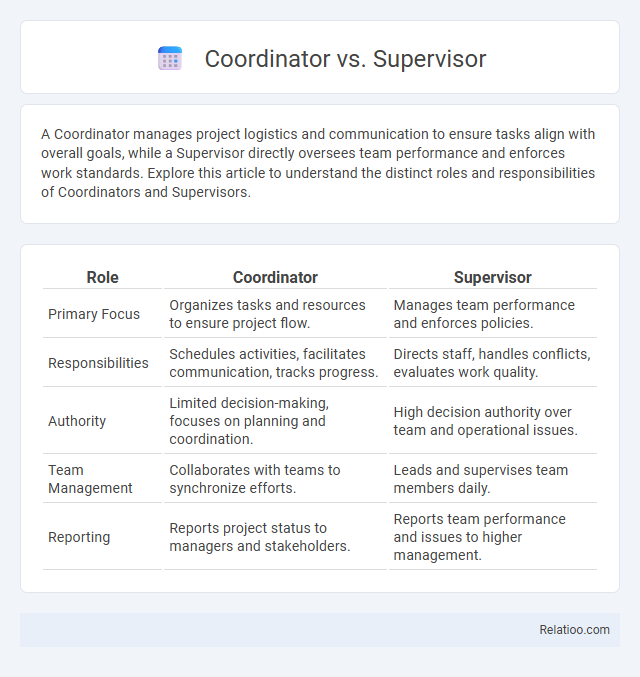A Coordinator manages project logistics and communication to ensure tasks align with overall goals, while a Supervisor directly oversees team performance and enforces work standards. Explore this article to understand the distinct roles and responsibilities of Coordinators and Supervisors.
Table of Comparison
| Role | Coordinator | Supervisor |
|---|---|---|
| Primary Focus | Organizes tasks and resources to ensure project flow. | Manages team performance and enforces policies. |
| Responsibilities | Schedules activities, facilitates communication, tracks progress. | Directs staff, handles conflicts, evaluates work quality. |
| Authority | Limited decision-making, focuses on planning and coordination. | High decision authority over team and operational issues. |
| Team Management | Collaborates with teams to synchronize efforts. | Leads and supervises team members daily. |
| Reporting | Reports project status to managers and stakeholders. | Reports team performance and issues to higher management. |
Understanding the Roles: Coordinator vs Supervisor
Understanding the roles of Coordinator and Supervisor hinges on their distinct responsibilities and scope of authority. Coordinators primarily focus on organizing schedules, resources, and communication to ensure project or event timelines are met effectively. Supervisors, on the other hand, oversee team performance, enforce work standards, and provide direct guidance, making your role determination crucial for aligning expectations with operational needs.
Key Responsibilities of a Coordinator
A Coordinator primarily manages project timelines, facilitates communication among team members, and ensures resource allocation aligns with organizational goals. Coordinators orchestrate schedules, track progress, and support department heads to maintain workflow efficiency. Unlike Supervisors who oversee staff performance and enforce policies, Coordinators focus on operational logistics and cross-functional collaboration to achieve project milestones.
Main Duties of a Supervisor
A Supervisor primarily oversees daily operations, manages team performance, and ensures compliance with company policies, directly guiding employees to meet organizational goals. Coordinators focus on organizing tasks, scheduling activities, and facilitating communication among departments to streamline workflow. Your understanding of these roles helps clarify that Supervisors hold more direct managerial responsibilities, whereas Coordinators emphasize logistical support and coordination.
Core Skills Required for Each Position
Coordinators require strong organizational and communication skills to manage project timelines and liaise between teams effectively. Supervisors need leadership abilities, conflict resolution skills, and a deep understanding of operational processes to oversee staff performance and ensure compliance with company policies. Coordinators combine multitasking capabilities with strategic planning expertise to align resources and goals across departments efficiently.
Hierarchical Position in the Organizational Structure
In the organizational structure, a Coordinator typically holds an entry to mid-level position responsible for managing specific projects or tasks within a department, while a Supervisor occupies a higher hierarchical rank with direct oversight of employees and daily operations. Coordinators report to Supervisors or Managers, who in turn ensure that team objectives align with company goals. Your clarity on these distinctions can enhance role allocation and streamline communication within your organization.
Decision-making Authority: Who Holds More Power?
Supervisors typically hold more decision-making authority than coordinators, as they oversee team performance, manage resources, and make tactical decisions impacting daily operations. Coordinators primarily focus on organizing schedules, facilitating communication, and ensuring project tasks align, often executing plans set by supervisors or managers. Your understanding of these roles clarifies that supervisors are empowered to make strategic decisions, while coordinators support with operational coordination and task management.
Communication and Team Management Differences
Coordinators primarily facilitate communication flow between teams and ensure alignment of project tasks, while supervisors oversee daily team operations and directly manage employee performance. Coordinators emphasize collaboration and information dissemination without authoritative control, whereas supervisors have decision-making authority and handle team discipline and motivation. Both roles require strong communication skills, but coordinators act as communication hubs, and supervisors focus on direct leadership and team management.
Common Industries for Coordinators and Supervisors
Coordinators and supervisors commonly work in industries such as healthcare, education, construction, and logistics, where coordinators focus on organizing project activities and resources, while supervisors manage team performance and daily operations. In corporate environments, coordinators often handle administrative tasks and event planning, whereas supervisors ensure compliance with company policies and oversee direct staff interactions. Both roles are essential for operational efficiency but differ in scope, with coordinators emphasizing task coordination and supervisors emphasizing personnel management.
Career Growth Opportunities: Coordinator vs Supervisor
Coordinator roles typically emphasize project management and cross-functional collaboration, offering foundational experience for career growth in administration and operations. Supervisor positions provide leadership responsibilities, including team management and performance evaluation, which can lead to higher managerial roles and specialized career paths. Understanding your career goals helps determine whether gaining broad organizational knowledge as a Coordinator or developing leadership skills as a Supervisor aligns better with your professional growth.
How to Choose Between Becoming a Coordinator or Supervisor
Choosing between becoming a coordinator or supervisor depends on your career goals and preferred level of responsibility. Coordinators typically focus on organizing tasks, managing schedules, and ensuring project alignment, making it ideal if you enjoy detailed planning and collaboration. Supervisors oversee team performance, provide guidance, and handle administrative duties, which suits individuals ready to lead personnel and drive productivity; understanding these distinctions can help your decision align with your strengths and aspirations.

Infographic: Coordinator vs Supervisor
 relatioo.com
relatioo.com